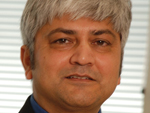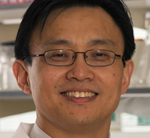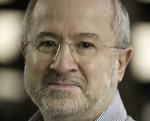 |
Iqbal Ahmad, Ph.D. |
 |
Jialin Zheng, M.D. |
 |
Angie Rizzino, Ph.D. |
The grants are part of the Stem Cell Research Act — also known as LB 606 — a compromise on embryonic stem cell research (ESC) that was overwhelmingly approved by the Nebraska Legislature and signed by Gov. Dave Heineman in 2008.
LB 606 allows the university to conduct research on human ESC lines as long as the cell lines were developed elsewhere. The legislation states that the university may not create or destroy embryos. It also created grants to help investigators advance stem cell research that doesn’t involve human embryos or human embryonic stem cell lines.
“This is great news for these scientists and the medical center as a whole,” said James Turpen, Ph.D., interim director of regenerative medicine at UNMC, of the newly-acquired grants. “These rewards reflect the high quality of the very important work being done by these investigators.”
UNMC secured three of the six grants the state rewarded this year. The selected investigators will each receive two-year, $150,000 grants to advance their research.
The UNMC researchers who received awards are:
- Iqbal Ahmad, Ph.D., professor in the department of ophthalmology and visual sciences, who works with adult stem cells to combat vision problems such as macular degeneration and glaucoma;
- Jialin Zheng, M.D., professor in the department of pharmacology and experimental neurosciences, who uses Induced Pluripotent Stem Cells (iPS cells) in his work to find regenerative therapies for Parkinson’s disease; and
- Angie Rizzino, Ph.D., professor in the Eppley Institute for Research in Cancer and Allied Diseases, who studies the molecular mechanisms that control the growth and differentiation of a class of stem cells that have the capacity to form any cell type in the body.
The projects were selected by the Stem Cell Research Advisory Committee, which is composed of the deans of Nebraska’s two medical schools and four scientists from outside of the state who have experience in non-embryonic stem cell research funded by the National Institutes of Health.
The money for the grants comes from the state’s tobacco settlement dollars.